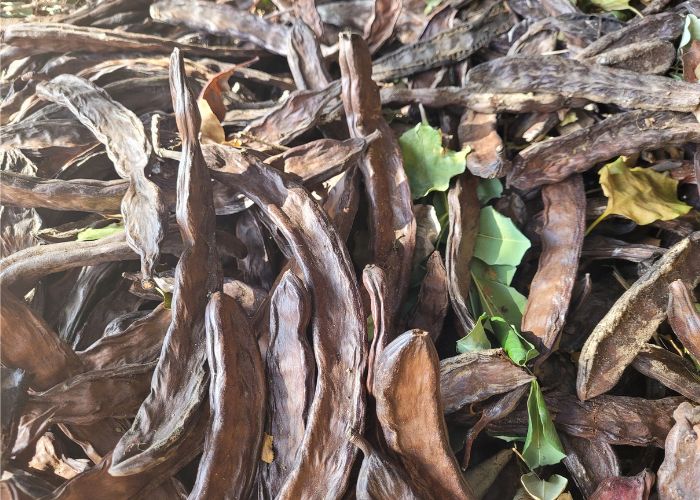VÉLEZ-MÁLAGA – They seem to belong to the so-called ‘superfood’, the beans of the carob tree. The Guardia Civil in southern Spain has now tracked down four criminal groups for theft of these fruits.
The increase in the value of carob beans on the market apparently aroused the criminals’ interest in this new “golden fruit” that grows abundantly in the Guadalhorce Valley in the province of Málaga. As part of operation ‘Datalga’, agents have arrested about thirty people who were involved in the theft and processing of the popular beans.
The detectives have found that there is a whole range of criminal activity related to the theft of the beans, according to Sur newspaper. In addition to the 30 people arrested, another ten people are being investigated for the following crimes: theft, forgery of documents, embezzlement and money laundering.
Because several complaints about thefts in farms were received by the police, they started the investigation. It concerned farms in the cities of Coín, Alhaurín de la Torre, Alhaurín el Grande, Álora, Cártama and Monda in Málaga. It was striking that precisely in that period the value of the bean on the market rose sharply to €2 per kilo.
As a result of the investigation, the Guardia Civil identified four criminal groups that centered their criminal activities around this fruit, leading to the arrest of the thirty individuals.
The agents also located a warehouse in Coín that apparently received the stolen carob beans without any form of control and without verification of their origin. According to Civil Guard sources, 156 forged documents related to the possession and commercialisation of this product were discovered in this same warehouse.
Carob beans
Carob beans, also known as carob pods or simply carob, are the fruit of the carob tree, which is native to the Mediterranean region where they are well-suited to the warm, dry climate. They are popular for a number of reasons:
- Culinary Uses: Carob beans are often used as a natural sweetener and as a substitute for chocolate. In southern Europe it is also referred to as ‘chocolate for the poor’. They can be ground into a powder and used in baking, cooking and as an alternative to cocoa powder.
- Nutritional value: Carob beans are a good source of dietary fiber, protein and antioxidants. They also contain vitamins and minerals such as calcium, potassium and magnesium.
- Medicinal Uses: Carob beans have traditionally been used for medicinal purposes. They are believed to have anti-inflammatory and antibacterial properties and have been used to treat a variety of conditions, such as digestive problems and skin conditions.
- Environmental aspects: Carob tree is a drought tolerant tree and is considered a sustainable crop because it requires little water and is unaffected by pests and diseases, allowing farmers to avoid the use of pesticides or fertilisers.
Overall, carob is a versatile and healthy option that can be used in a variety of ways, making it a popular choice among health-conscious consumers.


